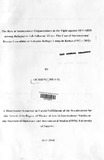| dc.description.abstract | The study sets out to investigate and analyse the role that is played by international organizations in the combat against HlV/AIDS among refugees in sub-Saharan Africa. Two categories of international organizations are looked at: the intergovernmental organizations which are the lead agencies in policy formulation and funding of programs, and non-governmental organizations which are the implementing and funding agencies. Specifically, an international non-governmental organization, International Rescue Committee - which is involved in operations against HIV/AIDS among refugees globally is the case study. The study looks at its operations at Kakuma Refugee Camp in Kenya from 1992 to the year 2002.
The study analyses; The role of states; The aspects of collaborations between lOs and states; and among lOs themselves; The policy frameworks- nationally and globally; The issue of funding of HIV/AIDS programs; The spread and impact of HIV/AIDS among refugees; And the relationship between gender and HIV/AIDS among refugees.
The study reaches a number of findings. The International Organizations are limited in their combat against HIV/AIDS among refugees due to: insufficiency of funding for such programs, poor collaboration efforts among the stakeholders, diverse socio-cultural and economic dynamics among refugee communities, the failure of the state to honor international polices, and the technical limitations in staffing and coordination of the programs. The state is also limited in terms of low political will, poor policy provision, and financial and expertise insufficiency.
The study concludes that for HIV/AIDS programs among refuges to be effective, there should be: close and keen observance of universal precautions, proper establishment of relevant infrastructure, continuous training of staff (both local and refugee), continued funding without conditionalities, closer collaboration among all the stakeholders, policies by all the states and the international organizations.
The study advocates a systematic monitoring and assessment of the impact of HIV/AIDS on various sectors among refugees such as health, education, security and households. It further recommends an investigation into the appropriate ways of incorporating refugees in the National Strategic Plan of HIV/AIDS, challenges to such measures and the possible remedies against the stumbling blocks to such efforts. | en |

